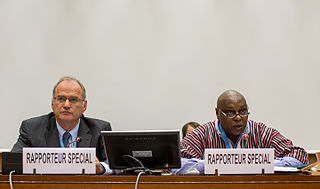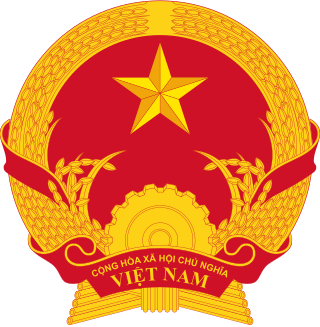Related Research Articles

The Universal Declaration of Human Rights (UDHR) is an international document adopted by the United Nations General Assembly that enshrines the rights and freedoms of all human beings. Drafted by a UN committee chaired by Eleanor Roosevelt, it was accepted by the General Assembly as Resolution 217 during its third session on 10 December 1948 at the Palais de Chaillot in Paris, France. Of the 58 members of the United Nations at the time, 48 voted in favour, none against, eight abstained, and two did not vote.

Special rapporteur are titles given to independent human rights experts whose expertise is called upon by the United Nations to report or advise on human rights from a thematic or country-specific perspective. Depending on the specific mandate, there can also be working groups composed of an independent expert from each of the five UN regional groupings. Their work falls within the scope of "special procedure" mechanisms under the United Nations Human Rights Council, and their contributions can advance human rights through a variety of activities, including, but not limited to improving access to redress, policy reform, mainstreaming human rights, raising human rights awareness, and acting to prevent or cease rights violations.
Contributing to the establishment of human rights system in Africa are the United Nations, international law and the African Union which have positively influenced the betterment of the human rights situation in the continent. However, extensive human rights abuses still occur in many sections of the continent. Most of the violations can be attributed to political instability, racial discrimination, corruption, post-colonialism, economic scarcity, ignorance, illness, religious bigotry, debt and bad financial management, monopoly of power, lack/absence of judicial and press autonomy, and border conflicts. Many of the provisions contained in regional, national, continental, and global agreements remained unaccomplished.
Human rights education (HRE) is the learning process that seeks to build up knowledge, values, and proficiency in the rights that each person is entitled to. This education teaches students to examine their own experiences from a point of view that enables them to integrate these concepts into their values, decision-making, and daily situations. According to Amnesty International, HRE is a way to empower people, training them so their skills and behaviors will promote dignity and equality within their communities, societies, and throughout the world.

Human rights in Vietnam are considered low by various domestic and international academics, dissidents and non-governmental organizations (NGOs) such as Amnesty International (AI), Human Rights Watch (HRW), and the United Nations High Commissioner for Human Rights (OHCHR).
A human rights defender or human rights activist is a person who, individually or with others, acts to promote or protect human rights. They can be journalists, environmentalists, whistleblowers, trade unionists, lawyers, teachers, housing campaigners, participants in direct action, or just individuals acting alone. They can defend rights as part of their jobs or in a voluntary capacity. As a result of their activities, human rights defenders (HRDs) are often subjected to reprisals including smears, surveillance, harassment, false charges, arbitrary detention, restrictions on the right to freedom of association, physical attack, and even murder. In 2020, at least 331 HRDs were murdered in 25 countries. The international community and some national governments have attempted to respond to this violence through various protections, but violence against HRDs continues to rise. Women human rights defenders and environmental human rights defenders face greater repression and risks than human rights defenders working on other issues.

Global Witness is an international NGO established in 1993 that works to break the links between natural resource exploitation, conflict, poverty, corruption, and human rights abuses worldwide. The organisation has offices in London and Washington, D.C.

Navanethem "Navi" Pillay is a South African jurist who served as the United Nations High Commissioner for Human Rights from 2008 to 2014. A South African of Indian Tamil origin, she was the first non-white woman judge of the High Court of South Africa, and she has also served as a judge of the International Criminal Court and President of the International Criminal Tribunal for Rwanda. Her four-year term as High Commissioner for Human Rights began on 1 September 2008 and was extended an additional two years in 2012. She was succeeded in September 2014 by Prince Zeid bin Ra'ad. In April 2015 Pillay became the 16th Commissioner of the International Commission Against the Death Penalty. She is also one of the 25 leading figures on the Information and Democracy Commission launched by Reporters Without Borders.

The Convention on the Rights of Persons with Disabilities is an international human rights treaty of the United Nations intended to protect the rights and dignity of persons with disabilities. Parties to the convention are required to promote, protect, and ensure the full enjoyment of human rights by persons with disabilities and ensure that persons with disabilities enjoy full equality under the law. The Convention serves as a major catalyst in the global disability rights movement enabling a shift from viewing persons with disabilities as objects of charity, medical treatment and social protection towards viewing them as full and equal members of society, with human rights. The convention was the first U.N. human rights treaty of the twenty-first century.

Salil Shetty is an Indian human rights activist who was the Secretary General of the human rights organization Amnesty International (2010–2018) till 31 July 2018. Previously, he was the director of the United Nations Millennium Campaign. Before joining the UN, he served as the Chief Executive of ActionAid. Most recently, Shetty had a short stint as the Vice President of Global Programs at the Open Society Foundations.
Pablo de Greiff is a Colombian academic and human rights activist, who served as the first United Nations Special Rapporteur on the promotion of truth, justice, reparation and guarantees of non-recurrence. In January 2015 he was also asked to be part of UNIIB, a United Nations mission of Independent Experts to address the situation in Burundi. From 2019 to 2020 he was part of a group of experts advising the UN Human Rights Council on its preventive functions. Since 2014 he is a Senior Fellow at the Center for Human Rights and Global Justice of the School of Law at New York University, where he directs both the Transitional Justice Program and the Prevention Project.

Maina Kiai is a Kenyan lawyer and human rights activist who formerly served as the United Nations Special Rapporteur on the rights to freedom of peaceful assembly and of association from May 1, 2011, to April 30, 2017. Since 2018, he has headed Human Rights Watch's Alliances and Partnerships program.

Agnès Callamard is a French human-rights activist who is the Secretary General of Amnesty International. She was previously the Special Rapporteur on extrajudicial, summary, or arbitrary executions appointed by the United Nations Human Rights Council, and the former Director of the Columbia University Global Freedom of Expression project.
Gerard Quinn is a professor of law at the University of Leeds and at the Wallenberg Institute in the University of Lund, Sweden. He was formerly professor of law at NUI Galway, Ireland, and Director of the university's Centre for Disability Law and Policy at the School of Law. He was appointed to the Council of State by the President of Ireland, Michael D. Higgins in 2012.
Ahmad Reza Djalali is an Iranian-Swedish disaster medicine doctor, lecturer, and researcher. He was accused of espionage and collaboration with Israel and sentenced to death. He has worked in several universities in Europe, among which Karolinska University of Sweden, where he had also attended his PhD program, Università degli Studi del Piemonte Orientale (Italy), Vrije Universiteit Brussel (Belgium). He also cooperated with universities in Iran and is in contact with universities worldwide.

Victor Madrigal-Borloz is a Costa Rican lawyer. Since 2018, he has served as the United Nations Independent Experton protection against violence and discrimination based on sexual orientation and gender identity . During his tenure at the U.N., Madrigal-Borloz has been noted for focusing his Human Rights Council mandate on investigating a broad and intersectional range of issues facing LGBT communities around the world, including conversion therapy, criminalization, socio-cultural exclusion, anti-trans rhetoric, and the outsized impact of the COVID-19 pandemic on vulnerable LGBT and gender-diverse populations.

Marcia Vaune Jocelyn Kran is a Canadian lawyer and expert member of the UN Human Rights Committee. Kran's career has spanned international human rights law, criminal law and political science for over forty years, and includes positions in academia and civil society. Kran has held a range of senior United Nations positions including in international human rights law.
Mihir Kanade is an author and professor of international law, human rights and development at the University for Peace (UPEACE), an international treaty-based organization and institution of higher education established in pursuance of Resolution 35/55 adopted by the United Nations General Assembly in 1980. He holds the concurrent positions of the Academic Coordinator of UPEACE since 2016, the Head of its Department of International Law since 2014, and the Director of the UPEACE Human Rights Centre since 2009. Kanade is best known for his contribution to the promotion of the human right to development. He chairs the drafting group appointed by the Office of the United Nations High Commissioner for Human Rights and the Chair-Rapporteur of the Intergovernmental Working Group on the Right to Development, for preparing the “zero draft” of a legally binding instrument on the right to development. On 13 March 2020, Kanade was elected by the United Nations Human Rights Council as a member of the Expert Mechanism on the Right to Development in representation of the Asia-Pacific region. The Human Rights Council renewed his mandate for another three years on 4 April 2023.

E. Tendayi Achiume is the Alicia Miñana Professor of Law and former Faculty Director of the Promise Institute for Human Rights at the University of California, Los Angeles. She served as the United Nations special rapporteur on Racism, Racial Discrimination, Xenophobia and Related Intolerance from her appointment in September 2017 until November 2022. She was the first woman appointed to this position since its creation in 1993.
Clément Nyaletsossi Voule is a Togolese diplomat and jurist. Voule has served as the United Nations Special Rapporteur on the Rights to Freedom of Peaceful Assembly and of Association since 2018. Prior to this, Voule served as African Advocacy Director International Service for Human Rights (ISHR).
References
- ↑ http://www.abanet.org/rolsymposium/docs/iba_speaker_biographies.pdf [ dead link ]
- ↑ "Tawanda Mutasah". Open Society Foundations. Archived from the original on 5 March 2012. Retrieved 28 January 2011.
- ↑ "Tawanda Mutasah announced new head of Law & Policy for Amnesty International". www.amnesty.org. 9 July 2014. Retrieved 25 October 2020.
- ↑ "Sample of LL.M. Alumni in Public Service". Harvard Law School. Retrieved 25 October 2020.
- ↑ Guardian Staff (28 April 2014). "There is no legal barrier to UN cross-border operations in Syria | @guardianletters". The Guardian. ISSN 0261-3077 . Retrieved 25 October 2020.
- ↑ "Special Guest Tawanda Mutasah". Manufacturing Talk Radio Podcast. 29 March 2017. Retrieved 25 October 2020.
- ↑ "Staff: Tawanda Mutasah". Open Society Foundation. Retrieved 17 September 2013.
- ↑ "Watch all Talks". UNESCO. 4 October 2017. Retrieved 25 October 2020.
- ↑ "OHCHR | Death Penalty and Transparency – What's to Hide?". www.ohchr.org. Retrieved 25 October 2020.
- ↑ "The Role of Religion in Peace Negotiations in African Contexts". PON - Program on Negotiation at Harvard Law School. 8 September 2008. Retrieved 25 October 2020.
- ↑ "Zimbabwe's outlaw regime". Jordan Times. 10 August 2020. Retrieved 25 October 2020.
- ↑ "PDHRE: Teach-In". www.pdhre.org. Retrieved 25 October 2020.
- ↑ "Réunion à Lisbonne de la sixième session du Conseil d'administration de CoDA". African Development Bank - Building today, a better Africa tomorrow. 26 February 2019. Retrieved 25 October 2020.